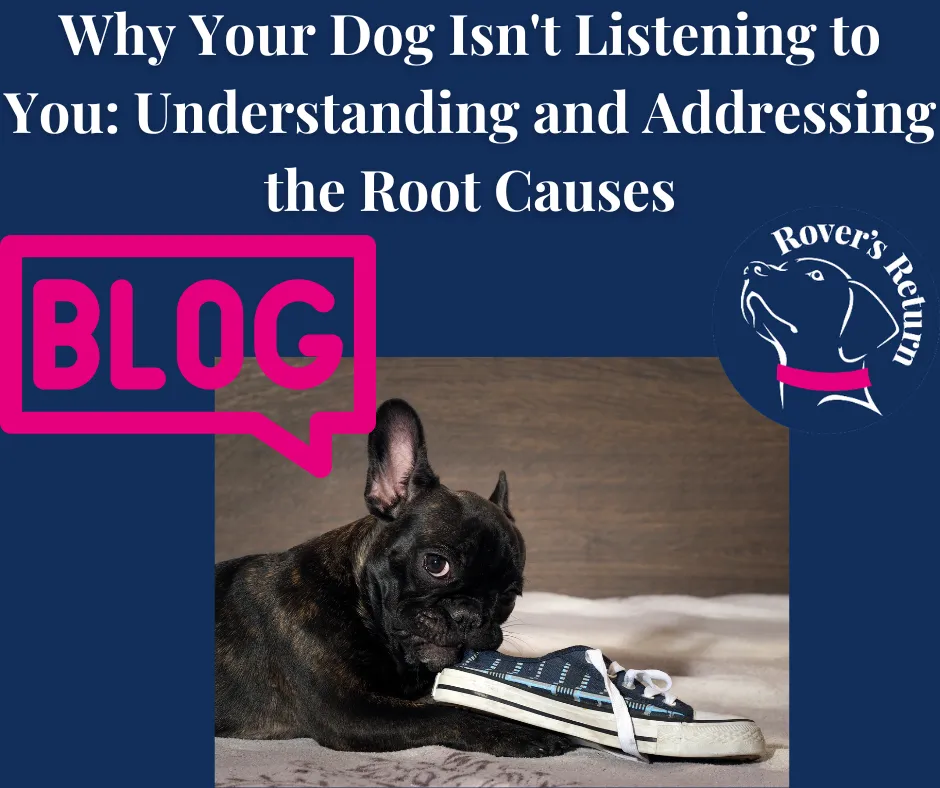Book a FREE 1:1 Assessment Call By Clicking HERE
Specialising In Dog Reactive Behviour
Accredited by APDT, ABTC and UK DOG Behaviour and Training Charter
Qualified and Experienced
Force Free Trainer and Behaviourist
Dog Training Leicestershire Educational Blogs

Why Your Dog Isn't Listening to You: Understanding and Addressing the Root Causes

Why Your Dog Isn't Listening to You: Understanding and Addressing the Root Causes
As a dog owner, there's nothing more frustrating than calling your dog's name only to be ignored. Whether you're trying to get your dog to come back during a walk, follow basic behaviours, or stop undesirable behaviours, it can be disheartening when they just don’t seem to listen to you. But before you conclude that your dog is being stubborn or disobedient, it's important to understand that there are various reasons why your dog might not be responding to you. In this blog, we’ll explore some common causes and offer tips on how to improve communication and training.
My Dog Doesn’t Listen To Me But Listens To Others
This is common and can happen when dogs see value in people, particularly those who give them extra fuss and treats.
My training methods seek to train a dog that knows how to behave, and not one that has to be told what to do. We call our dogs names so often and tell them no, do this, do that and it becomes white noise and they learn not to listen to us.

Why isn't my dog listening to me?
There are many reasons why your dog isn’t listening to you, here are a few of them
1. Lack of Training or Inconsistent Training
One of the most common reasons a dog might not listen is simply because they haven’t been trained properly. Training requires consistency, patience, and clear communication. If a dog hasn’t been taught what behaviours you are expected to or if training is not reinforced regularly, they won't understand what you're asking them to do. Inconsistent training can also confuse your dog, making it difficult for them to know what’s expected.
What to Do: Make sure you're providing consistent, positive reinforcement training. Use the same cues for the same behaviours, and reward your dog when they respond correctly. Practice regularly to keep the commands fresh in their mind. Remember, you don’t always have to tell your dog what to do, learning happens when behaviours are reinforced, so when your dog does something good, reward them and it will happen again and again!
2. Distractions in the Environment
Dogs are easily distracted by their surroundings, especially in environments that are full of new smells, sounds, and sights. If your dog isn't listening to you, it might be because they're too focused on something else—a squirrel, another dog, a person, or even an interesting scent on the ground.
What to Do: Start training in a low-distraction environment and gradually increase the level of distraction as your dog becomes more responsive. Use high-value treats or toys to get their attention when you’re in a distracting environment.
3. Lack of Motivation
Sometimes, a dog simply isn’t motivated to listen. This could be because they don't find the reward you’re offering compelling enough, or they may not see the value in obeying a command at that moment. Dogs are more likely to respond to commands if they know there's something in it for them. Your dog may be tired and struggling to concentrate.
What to Do: Ensure you’re using rewards that your dog really values. This could be a favourite treat, toy, or even praise and affection. Understanding what motivates your dog can make a huge difference in their willingness to listen. Training should be fun and if you or your dog are not in the right frame of mind for learning stop and do it another time.
4. Unclear Communication
Dogs rely heavily on body language and tone of voice to understand what we're asking of them. If your training is inconsistent or your body language is confusing, your dog might not understand what you want. If you are stressed or frustrated they can pick up on your feelings which can be confusing for them.
What to Do: Pay attention to your body language and tone of voice when giving commands. Be clear and consistent with your signals, and try to avoid sending mixed messages. Your dog will respond better when they clearly understand what you're asking. Be aware of your dog's communication when they are struggling, you may see displacement behaviours such as scratching or sniffing the ground.
5. Anxiety or Fear
If a dog is feeling anxious, scared, or stressed, they may not be able to focus on what you're saying. Anxiety can stem from various sources—loud noises, unfamiliar environments, or even past trauma. When a dog is anxious, their fight-or-flight response kicks in, making it difficult for them to concentrate on anything else.
What to Do: If you suspect your dog is anxious or fearful, work on creating a safe and calm environment for them. Gradually desensitize them to the things that trigger their anxiety, and consider seeking advice from a professional trainer or behaviourist if the issue persists.
6. Medical Issues
In some cases, a dog’s lack of responsiveness might be due to an underlying medical issue. Hearing loss, for example, is common in older dogs and can make it difficult for them to respond to verbal commands. Other medical issues, such as pain or discomfort, can also affect a dog’s behaviour and willingness to listen.
What to Do: If your dog suddenly stops listening to you, it’s a good idea to have them checked by a veterinarian to rule out any potential medical issues. Addressing any health problems can help your dog feel better and become more responsive.
7. Overstimulation or Fatigue
Just like humans, dogs can become overstimulated or tired, leading to a lack of focus. If your dog has been running around or playing for a long time, they might be too tired to listen. Overstimulation can also occur if a dog is exposed to too many new stimuli at once, making it difficult for them to process commands.
What to Do: Give your dog plenty of rest and downtime, especially after intense play or exercise. If you’re training, keep sessions short and fun, and always end on a positive note before your dog becomes too tired or overstimulated.
8. Adolescent Dog ignoring commands
When they reach adolescence it is common for dogs that have previously had a great recall to suddenly run off. Hormones are driving the instinct to range further and chase other dogs. This happened to me when my dog was around 10 months old.
What to Do: You will have to go back to basics. Keep your dog on the lead, choose a high-value reward and retrain recall progressing to a long line to give them space to roam and return to you.
How Do I Get My Dog To Listen to Me Again?
When you have a great relationship with your dog listening will not be a problem, follow the advice above, give them time and plenty of great reinforcement training and your dog will begin to focus with you and ignore the distractions in the environment.

How To Discipline A Dog That Won't Listen?
You don’t force is never the answer, your dog won’t listen if you try to make them by using discipline. It will only make them more scared and anxious.
Final Thoughts
Understanding why your dog isn’t listening is the first step toward improving communication and strengthening your bond. Remember, dogs want to please their owners, but they need guidance, patience, and clear communication to do so. By addressing the root causes and using positive reinforcement, you can help your dog become more responsive and attentive to your commands. Whether it’s a matter of better training, clearer communication, or addressing medical or emotional needs, a little effort can go a long way in ensuring your dog listens and responds effectively.

Highly Qualified Behaviourist
Accredited by APDT, ABTC and UK DOG Behaviour and Training Charter
Accredited Scentwork Instructor
Force Free Trainer and Behaviour
Force Free Trainer and Behaviour
Accredited Scentwork Instructor
Accredited by APDT, ABTC and UK DOG Behaviour and Training Charter
Highly Qualified Behaviourist
Contact Us
Sam: 07725 802995
You can contact us via Live Chat button at the bottom of the screen or the contact box to the right.
You can also book one of our services online using the View Dates buttons under the service you require.
© 2023 by Rovers Return Dog Trainers Academy - Force Free Dog Training Lutterworth, Broughton Astley, Leicestershire, Hinckley, Nuneaton, Stoney Stanton, South Kilworth, Ullesthorpe
Privacy Policy | Terms and Conditions | Terms and Conditions of Services | Sitemap

Facebook
Instagram
X
LinkedIn
Youtube
TikTok